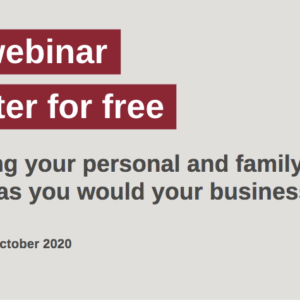Important changes to the January 2021 Self Assessment deadline
2021 deadline for Self Assessment tax returns – We take a look at these changes and why you need to take action now.
For the circa 12 million people in the UK who are required to submit a Self Assessment tax return, the annual deadline is now only weeks away. For this assessment, many people and their businesses may have been affected by Covid-19 and with the significant changes introduced by the Government in 2020, it is even more important to ensure that you have an understanding of what you need to do and take action, well ahead of the January 2021 filing deadline.
What changes have taken place to the 2021 Self Assessments as a result of COVID-19?
The significant changes that took place this year as part of the Government’s support package for businesses impacted by COVID-19 included deferring the deadline to pay the second payment on account for the tax year 2019/20 from 31 July 2020 to January 31 2021.
In addition to this, the Chancellor announced a further change in September 2020, with the ability to defer payment further with a 12-month Time to Pay extension, for those impacted by COVID-19. This now means that those payments deferred from July 2020 and those due in January 2021 will now be able to be spread over the next 12 months subject to HMRC agreement, under a Time to Pay arrangement.
When will you now need to make 2021 Self Assessment payments?
If you don’t agree a Time to Pay with HMRC, then the July 2020 payment on account (if you deferred this and it hasn’t yet been paid) together with the balancing payment, will be due on 31 January 2021. Alongside this, you will also be required to make your first payment on account for the 2020/21 tax year (which is calculated at 50% of your 2019/20 tax liability). Effectively you will be paying the equivalent of a whole years’ tax in one go under this scenario.
If you have been impacted by COVID-19 and do agree a Time to Pay extension with HMRC, then the July 2020 payment on account (if not already paid) and the balancing payment from 2019/20 can be paid in 12 monthly installments before 31 January 2022. As it stands, you will still have to pay your first payment on account for the 2020/21 tax year. To facilitate this, a tax return will need to be submitted and a Time to Pay agreement reached before the 31 January 2021 deadline.
How to apply for a 12-month Time to Pay extension to your 2021 Self Assessment
If you are wishing to agree a Time to Pay with HMRC, the January 2021 Self Assessment tax return will still need to be filled on time by 31 January 2021. It is usual procedure that HMRC will not discuss a Time to Pay arrangement until this (and any previous unfiled tax returns) are filed.
Whilst the deadline for submitting these is 31 January 2021, HMRC are always very busy during this time, so getting your affairs in order early will greatly help you.
Those with a tax debt of up to £30,000 should be able to set up a payment plan online over 12 months to January 2022, if they are facing difficulties in paying. Those with debts over this amount will need to speak to HMRC to set up the plan, which can be an arduous task contacting HMRC during these busy times
Naturally, it will be important to understand your liability as soon as possible, especially if you wish to consider electing to make a Time to Pay arrangement.
What charges will be levied on late Self Assessment payments?
For those choosing to defer/agree a 12-month Time to Pay, no penalties will be levied, although interest is usually charged on Time to Pay arrangements. Furthermore, Self Assessments not submitted by the deadline will still occur late penalties and fees.
Should you ask for a 12-month Time to Pay extension?
Whilst on the surface it may appear beneficial for everyone to opt for an additional 12-month Time to Pay extension, careful consideration should be given as it may be useful to pay part, if not all the payment before the extended deadline.
You will need to understand your liabilities before making this decision. Once you know what you owe HMRC, you can consider your cashflow and likely receipts and payments going forward.
Caution on agreeing to Time to Pay plans
When agreeing a Time to Pay arrangement with HMRC, it is important to only agree what you can afford. If a workable arrangement plan cannot be reached, it would be prudent to take professional advice.
If an agreement plan is not kept, HMRC are less likely to agree a revised plan. Similarly, if you have agreed a plan that was affordable at the time of agreement and your circumstances change for the worst, it is important to notify HMRC as soon as possible, before a default occurs.
How sorting out your Self Assessment tax return as early as possible will help you
Allowing yourself as much time as possible to get your affairs in order will give you more breathing space to plan any future payments. Until your 2019/20 liability is known, you will not be able to consider this. Ultimately the tax will need to be paid, and it will be down to personal circumstances as to whether to pay this in January 2021 or delay this further by paying in agreed Time to Pay instalments throughout 2021.
We’re here to help
Our specialist tax team assists a wide range of clients’ Self Assessment submissions each year, where we calculate liability to ensure they are only paying the correct amount of tax they ought to. We also work to make sure businesses are structured in the most tax efficient way to suit personal needs.
Our team also provides help and advice on Time to Pay. We can ensure that all the required information, such as cashflows, budgets, forecasting and business plans are robust and up to date.
For more information, please contact our tax advice team on 0161 832 4841 for an initial chat, email info@alexander.co.uk or simply fill out the form below.





